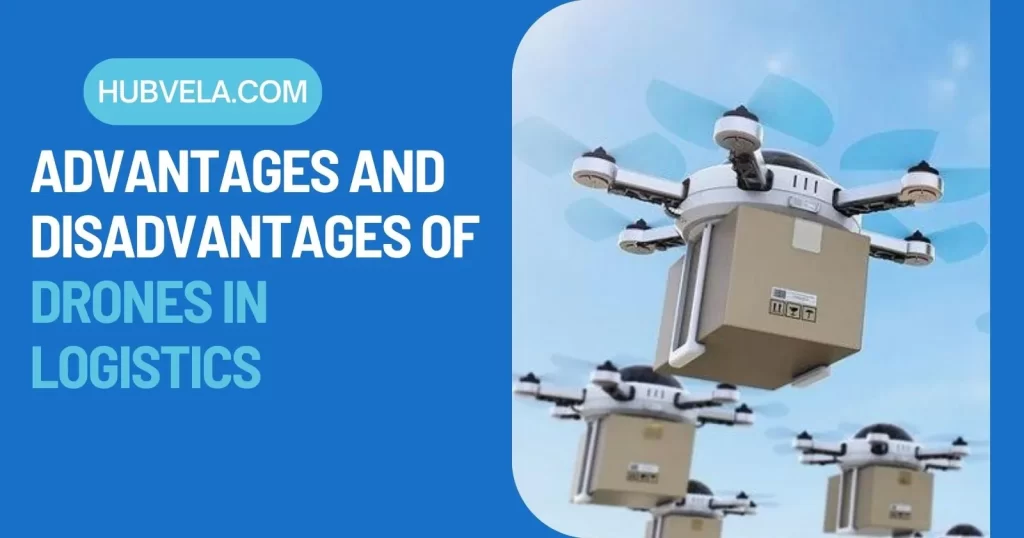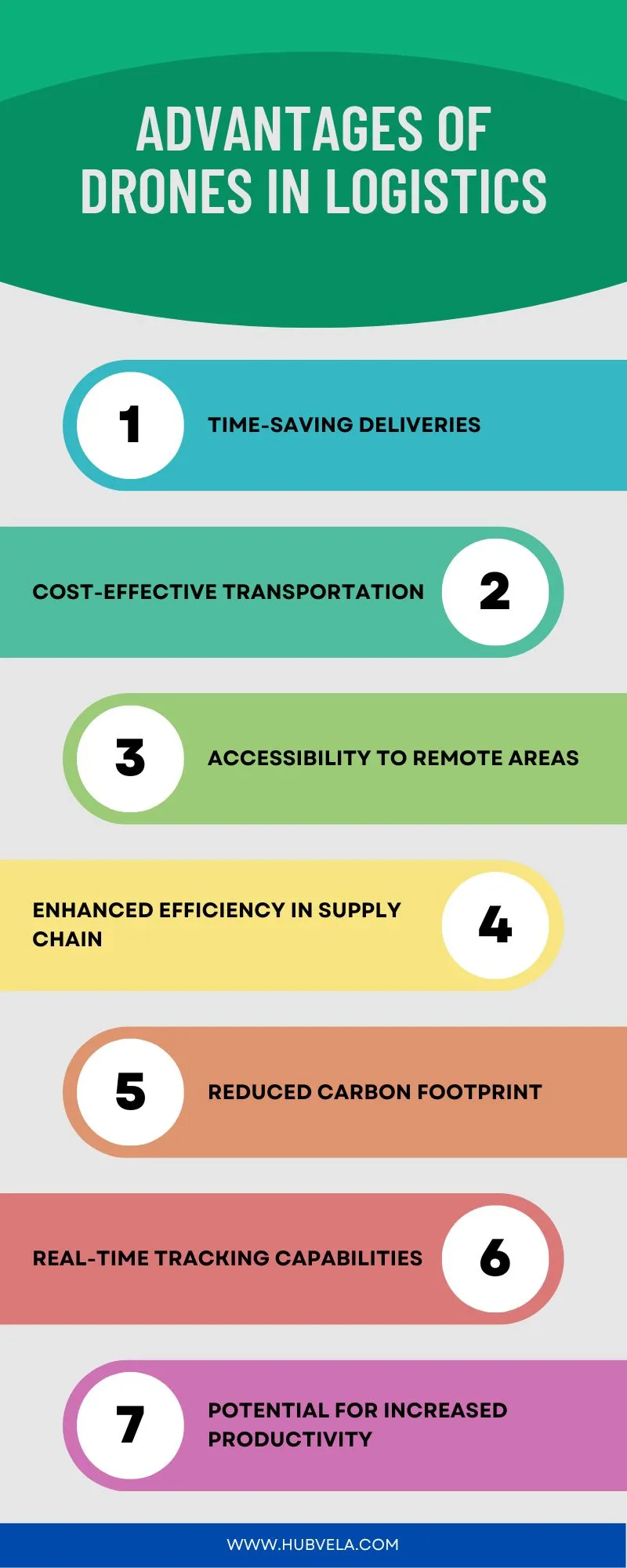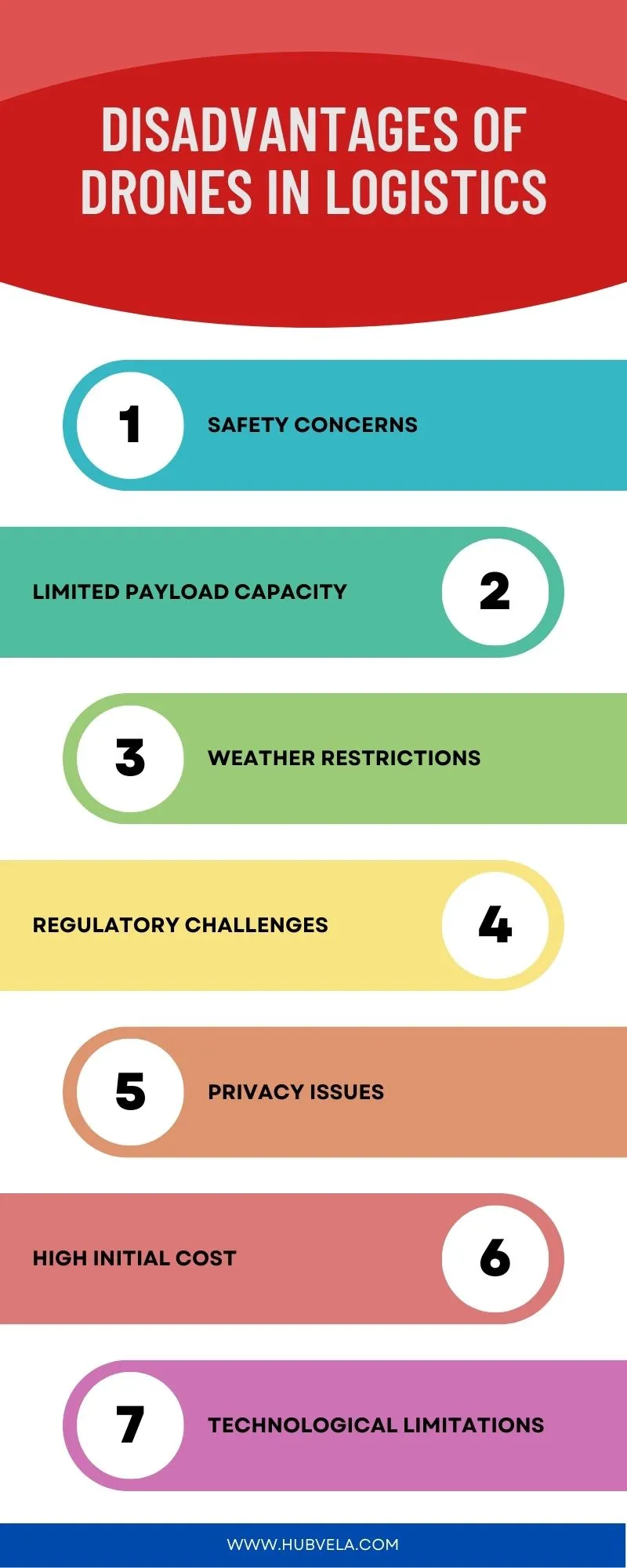Did you know that drones are revolutionizing the logistics industry? With their ability to navigate difficult terrains and deliver packages efficiently, drones are becoming an attractive option for companies looking to streamline their operations.
However, like any innovation, there are both advantages and disadvantages to using drones in logistics. In this article, we will explore both the advantages and disadvantages of drones in logistics.
So, whether you’re a logistics professional or simply curious about the future of package delivery, keep reading to discover the full picture of drones in logistics.

--Advertisement--
Advantages of Drones in Logistics
Drones are revolutionizing the logistics industry, offering various advantages such as enhanced efficiency, cost savings, and reduced environmental impact. The integration of drone technology in logistics operations has proven to be a game-changer, providing unparalleled benefits. Some of the key advantages of using drones in logistics include:

1. Time-Saving Deliveries
Drones in logistics offer a time-saving advantage by delivering packages quickly and efficiently. With their ability for quick transportation, drones can significantly improve delivery speed and expedited shipping.
This time efficiency is crucial in the logistics industry, where faster deliveries are essential for customer satisfaction. By bypassing traffic and other obstacles, drones can ensure that packages reach their destination in record time, making them a valuable asset in the logistics field.
2. Cost-Effective Transportation
One of the advantages of drones in logistics is their ability to provide cost-effective transportation. Drones can significantly reduce transportation costs, resulting in cost savings for businesses.
With their high delivery speed, drones can efficiently handle last mile delivery, reducing the need for traditional transportation methods. Additionally, drones don’t require extensive infrastructure requirements like roads and bridges, further contributing to cost savings.
3. Accessibility to Remote Areas
With their ability to reach remote areas quickly and efficiently, drones offer a significant advantage in logistics. Remote accessibility has always been one of the biggest logistical challenges, especially when it comes to last mile deliveries. Traditional methods often face operational limitations in these areas due to poor infrastructure and lack of connectivity.
However, drones can overcome these obstacles by flying directly to remote locations, bypassing the need for roads or other transportation networks. This enhances rural connectivity and ensures that even the most isolated communities can receive necessary supplies in a timely manner.
4. Enhanced Efficiency in Supply Chain
By streamlining operations and reducing delivery times, drones revolutionize the efficiency of the supply chain in logistics. Drones bring increased speed and improved accuracy to the process, allowing for faster and more precise deliveries.
With automated processes, the need for human intervention is reduced, minimizing the chances of human error. Drones also contribute to optimized inventory management by providing real-time data on stock levels and enabling quick replenishment.
5. Reduced Carbon Footprint
As we shift our focus to the advantages of drones in logistics, one notable benefit is the significant reduction in carbon footprint that they offer.
Drones contribute to reduced emissions and have a lower environmental impact compared to traditional transportation methods. This sustainability benefit is achieved through their ability to bypass congested roadways and deliver goods directly, resulting in a carbon footprint reduction.
6. Real-Time Tracking Capabilities
Drones in logistics offer the advantage of real-time tracking capabilities, allowing companies to monitor the location of their packages throughout the delivery process. This enables delivery optimization, as companies can efficiently manage their inventory in real time and make necessary adjustments.
Drones also facilitate route optimization, ensuring the fastest and most efficient delivery routes.
Additionally, drones enable asset tracking, allowing companies to monitor their valuable assets during transportation.
Ultimately, these real-time tracking capabilities lead to improved customer service, providing customers with accurate and up-to-date information about their deliveries.
7. Potential for Increased Productivity
How can drones in logistics contribute to increased productivity?
Drones offer several advantages that can boost productivity in the logistics industry. One way is through increased speed, as drones can deliver packages faster than traditional methods.
Additionally, drones provide operational flexibility, allowing for faster response times and efficient delivery routes.
They also enhance inventory management by providing real-time tracking and monitoring.
Disadvantages of Drones in Logistics
Drones have the potential to revolutionize the logistics industry by offering various benefits, such as speed, efficiency, and cost savings. However, there are also several disadvantages and challenges associated with using drones in logistics. Some of the main drawbacks include:

1. Safety Concerns
One major concern when it comes to using drones in logistics is the potential compromise of safety. Safety concerns arise due to various risk factors associated with drone operations.
The possibility of accidents occurring during delivery, especially in populated areas, raises concerns about accident prevention and emergency response.
Additionally, ensuring compliance with safety regulations is crucial to mitigate potential risks and maintain a safe environment for both drones and people.
2. Limited Payload Capacity
As we delve into the disadvantages of using drones in logistics, one notable drawback is the limited payload capacity they possess. Drones are subject to payload limitations and weight restrictions, which significantly impact their cargo capacity and load capacity. These transport constraints can be a hindrance when it comes to efficiently transporting larger and heavier items.
While drones have proven to be effective in delivering smaller packages, their limited carrying capacity restricts their usefulness in certain logistical scenarios.
3. Weather Restrictions
Weather restrictions pose a significant disadvantage for drones in logistics, limiting their operational capabilities and causing potential delays in delivery. Drones are highly sensitive to adverse weather conditions such as strong winds, heavy rain, and fog, which can affect their ability to fly safely and maintain stability. Flight restrictions are often imposed to ensure the safety of both the drone and other airspace users.
These operational limitations due to weather conditions can lead to safety precautions being taken and delivery delays, impacting the efficiency of drone logistics.
4. Regulatory Challenges
Despite the potential advantages of using drones in logistics, there are various regulatory challenges that hinder their widespread implementation and success.
Regulatory compliance, airspace restrictions, licensing requirements, privacy regulations, and safety standards are among the key obstacles faced by companies utilizing drones for logistical purposes.
Adhering to strict regulations and obtaining necessary licenses can be time-consuming and costly, while ensuring privacy and safety standards adds another layer of complexity to drone operations in the logistics industry.
5. Privacy Issues
Privacy concerns pose a significant disadvantage to the use of drones in logistics. The use of drones for data collection and surveillance raises important questions about data protection and legal implications.
Public perception of drones as invasive can lead to negative attitudes towards their use in logistics. Surveillance concerns arise as drones can capture images and videos without consent.
Ethical considerations about privacy and the potential misuse of drone technology further complicate the issue.
6. High Initial Cost
One major drawback of using drones in logistics is the significant upfront cost involved. The high initial cost of purchasing and maintaining drones can be a barrier for many companies, especially those with budget constraints. Investing in the necessary equipment, training, and technology can strain financial resources, making it difficult for businesses to adopt drone technology.
However, it’s crucial to consider the long-term benefits and potential cost savings that drones can bring to the logistics industry.
7. Technological Limitations
Drones in logistics face certain technological limitations that can hinder their effectiveness and efficiency in the industry.
These limitations include challenges such as operational issues, technical constraints, and performance issues.
For example, drones have limited battery life, which restricts their flight time and range. They also struggle with adverse weather conditions, such as strong winds and heavy rain, which can affect their stability and navigation.
Furthermore, technical constraints like payload capacity and communication range pose additional challenges for drone logistics operations.
Conclusion on Advantages and Disadvantages of Drones in Logistics
In weighing the benefits and drawbacks of utilizing drones in logistics, it’s evident that these unmanned aerial vehicles present a promising solution for enhancing efficiency and reducing costs in the transportation industry.
Despite the technological limitations, drones offer numerous advantages such as faster delivery times, reduced labor costs, and improved safety.
However, there are also disadvantages to consider, including regulatory challenges, limited payload capacity, and potential job displacement.


